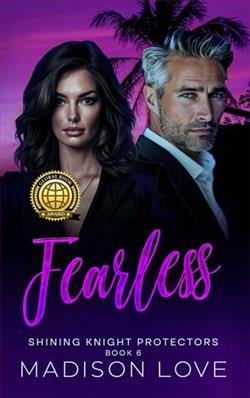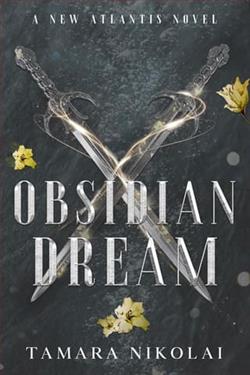Page 41 of Foul Days
“Yes. Fine. You can come. God knows I can use all the help I can get.” Bakharov looked exasperated, but beneath that, Kosara could see the panic seeping in. He hadn’t realised how much he didn’t know about monsters.
Good. He should be afraid.
“Great,” Sevar mumbled. “More dead weight.”
He climbed into the balloon’s wicker basket. Despite the cold, sweat beaded on his forehead. One of his eyelids trembled in a nervous tic.
“What are you waiting for?” He waved them over. “All aboard!”
Bakharov and Kosara sat on the bench while Sevar lit up the burner. The sweet smell of gas filled the air. Kosara’s hair flew up, tickling her face and knotting itself around the rigging. The snowflakes whirled, melting when they got too close to the fire.
“I hope you know how to use that thing.” Sevar nodded towards Bakharov’s revolver.
Bakharov spun it around his finger. “I’m not bad.”
“Show-off,” Kosara muttered.
At first, they flew so low over the ground that Kosara felt as if she could reach and grab a snowball from one of the roofs. Then, slowly, they gained height. The courtyard grew smaller and smaller until it was only a white dot in the distance. The balloon was definitely powered with magic—no ordinary hot-air balloon could fly that fast. It also seemed to have some sort of a cloaking spell on, so that they wouldn’t be easily spotted.
A smile spread across Kosara’s face when the dark spires of Chernograd emerged out of the fog. The Wall enveloped the city like an enormous snake, its ink-black body resting in between the houses, splitting streets in half. All that was separating Kosara from it was the thin wicker floor of the basket.
Her head began to spin. She wrapped her arms around her knees, her nails digging grooves into her skin and ladders in her tights.
“Are you okay?” Sevar asked.
“I think I might be getting travel sickness.”
“Great. Try not to puke all over my floor.”
“Doing my best,” Kosara said through gritted teeth. “I can’t make any prom—”
Bakharov shushed them. His eyes darted across the sky.
Kosara turned around. They soared gently through the clouds. The horizon had grown darker, and the air smelled of an approaching storm. It was so quiet, Kosara could hear the music from Belograd’s dance halls and piano bars far below.
She frowned at Bakharov. “What’s your prob—”
Something slammed against the basket, sending the balloon flying. Kosara staggered, her face painfully hitting Bakharov’s shoulder.
“What was that?” he shouted.
“My face,” Kosara said, massaging her bruised cheekbone.
“No, I meant—”
Another hit. This time, the balloon tilted, as if blown by a strong gust of wind. From this angle, Kosara saw the Wall far below clearly.
At first, its surface was unmoving like still water. Then a tentacle shot out of it: black, almost invisible in the dusk. As it slammed against the basket, lightning flashed. In the distance, thunder rolled.
“Oh no.” Kosara scrambled back, trying to get as far from the edge as possible.
Another lightning bolt illuminated the sky around them. They were surrounded by a swaying sea of tentacles, lashing at the wicker basket and wrapping around the silk envelope.
Sevar frantically pulled at the balloon’s ropes, trying to correct its flight path. It did nothing. Every time a tentacle hit the balloon, it sent it flying in a different direction.
Kosara’s swore quietly. This was why people spent their life savings on amulets to help them cross the Wall. They didn’t simply jump into a homemade hot-air balloon with a useless smuggler, like complete, utter idiots.
You don’t have your shadow anymore, she reminded herself. You really ought to be more careful.















